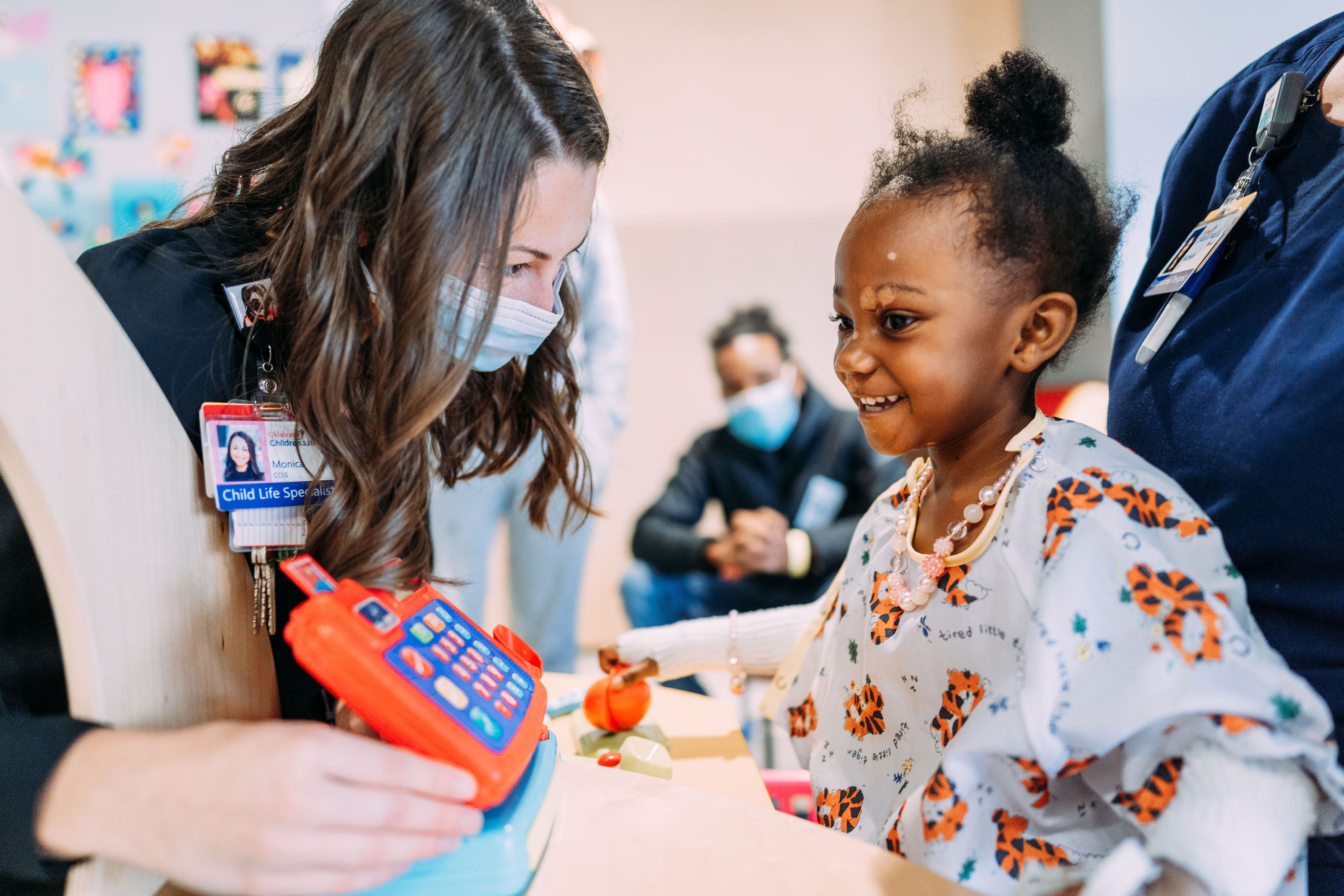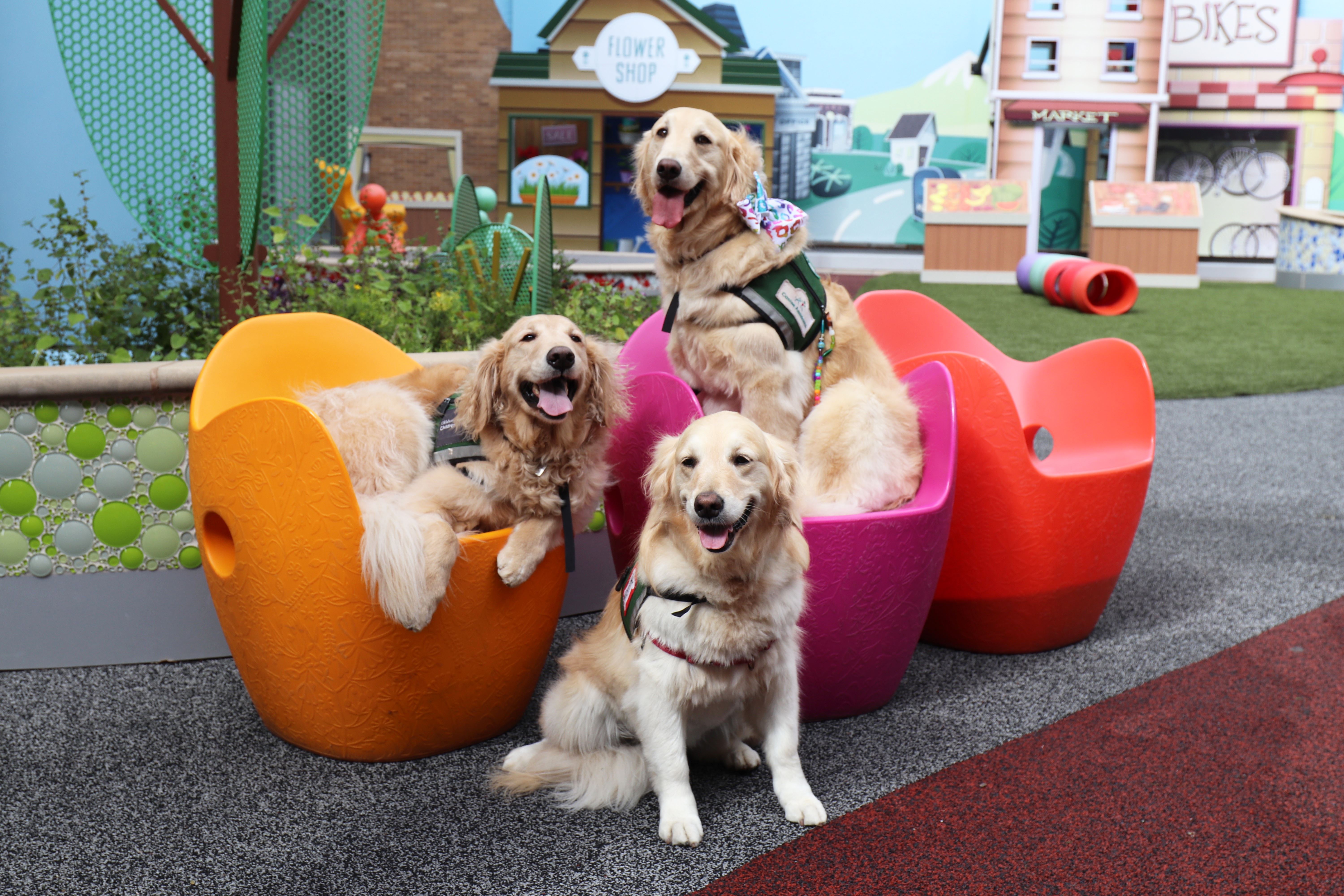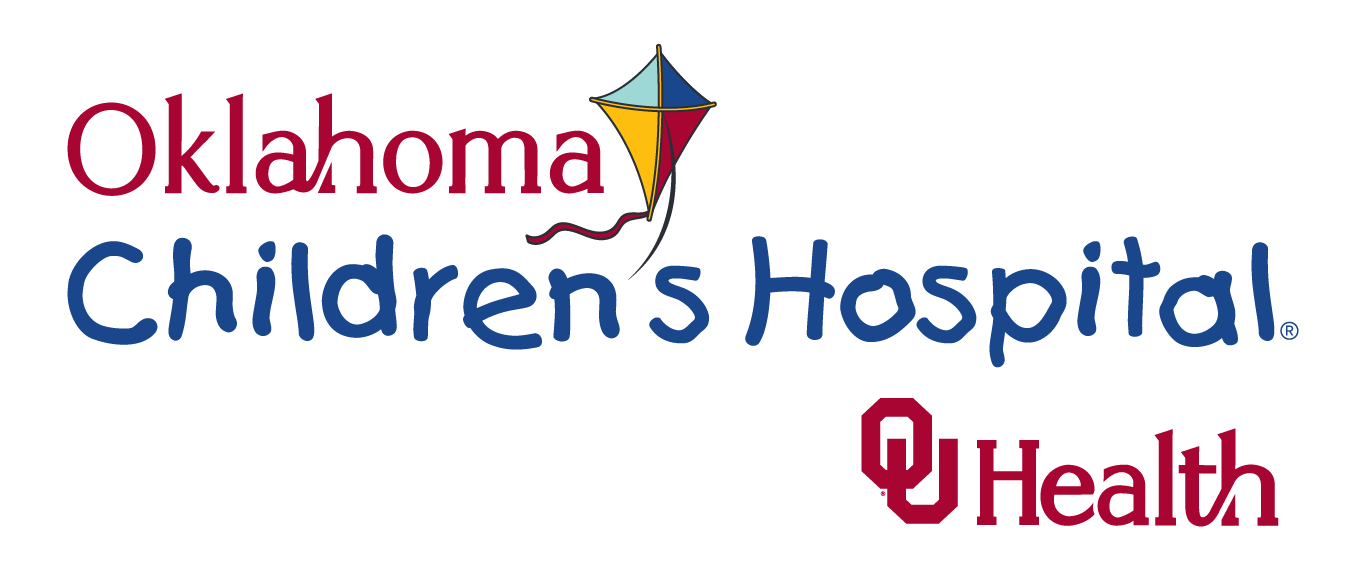Find out more about Child Life, Integrative and Creative Care Programs
or contact a member of our team.
Child Life & Therapeutic Programs
Whole Person Care for Your Child
Take advantage of the Certified Child Life Specialists at Oklahoma Children’s Hospital, part of your child’s medical team and the largest Child Life, Integrative and Creative Care program in Oklahoma. You’ll get the whole person care your child needs to support physical healing, psychosocial health and emotional well-being throughout a hospitalization.
The Child Life, Integrative and Creative Care team at Oklahoma Children’s truly understands what it means to take care of the whole child as well as the whole family. Child Life, Expressive Therapies (music, art, yoga), Child Life Zone, Gaming and Technology, School/STEM program, Facility Therapy Dog program, Volunteer services (link to their page), Family Resource Center (link to their page), and the Red Shelf Gift Shop.
At Oklahoma Children’s Hospital, you know you’re in the best place with the best people because each Child Life specialist holds bachelor’s and/or master’s degrees in child development, psychology or related areas, as well as national certification through the Association of Child Life Professionals. If you're interested in a career in Child Life, you can also learn more about our student programs.
Expert Child Life Services
 In addition to promoting positive healing and age-appropriate developmental
experiences during a hospital stay, Child Life specialists help your child
learn to cope and adjust in circumstances that might otherwise feel overwhelming.
In addition to promoting positive healing and age-appropriate developmental
experiences during a hospital stay, Child Life specialists help your child
learn to cope and adjust in circumstances that might otherwise feel overwhelming.
You and your hospitalized child will work with Child Life specialists on
developmental activities that help your child continue to learn and grow.
At the same time, you can reach out to these caring providers for the
social and emotional support you and your family need during stressful times.
Your child and family will benefit from a wide range of services provided by Child Life specialists who:
- Explain medical procedures in child-friendly and developmentally appropriate language
- Teach relaxation, distraction and coping skills before, during and after medical treatments and when facing chronic illness or life-altering conditions
- Offer emotional support for your child and family, including siblings
- Lead therapeutic play activities that help your child express emotion and manage distress during hospitalization
- Educate parents and caregivers about child development and response to hospitalization
- Engage your child in recreational or normalized play designed to encourage development using onsite activity areas, including The Zone, or at your child’s bedside
- Coordinate community events, parties and seasonal celebrations throughout the year to make the hospital environment as normal as possible for kids and their families
- Provide educational services regarding new diagnoses, sibling coping and developmental considerations during a hospitalization
Find Child Life specialists assigned to most patient care areas in Oklahoma Children’s Hospital or ask your child’s nurse or doctor for a referral.
The Child Life Zone
You may not connect the word “fun” with your hospitalized child, but your child and everyone in your family affected by the illness needs a way to take an occasional break. Learn more about The Zone at Oklahoma Children's Hospital.
Hospital Orientation for Your Child & Family
You can help reduce your child’s anxiety before hospitalization by participating in free educational sessions with Child Life specialists to better prepare everyone in your family for the experience.
Preparing for Surgery or a Medical Procedure
Call on Oklahoma Children’s Hospital’s Child Life specialists as you and your family prepare for your child’s surgery or medical procedure. Research shows that providing information about medical procedures before the event, using language children can understand, lowers anxiety and helps children recover more quickly than those who don’t receive age-appropriate information.
Start the conversation with your child by reading through the special eBook created by Oklahoma Children’s Hospital – It’s Your Visit – and narrated by Chipper, a cartoon-like character your child can enjoy.
Explore information about preparing for surgery, tips for parents and surgery services for children at Oklahoma Children’s Hospital.
Paws for Purpose

Oklahoma Children’s Hospital is home to Oklahoma’s largest full-time facility dog program, Paws for Purpose. Modeled after facility dog best practices at top children’s hospitals, it is a goal-directed program helping patients dealing with cognitive, physical and/or emotional disabilities to reach specific outcomes. It is not a “casual interaction” simply used to decrease boredom. It is a service provided that is completely donor and community funded.
Our Facility Dogs are specially trained from birth by Canine Assistants to work in a hospital setting. They train from birth until they are ready to work – anywhere from 18 months to 2 years old. After practicing in children’s hospitals in Atlanta and learning valuable skills that prepare them for full-time hospital work, they are matched with handlers here at their future home hospitals. Our Facility Dogs were specifically matched with the people they work with, which is why you’ll notice that they stay with the same 2-3 people while here at work!
What can our Facility Dogs do?
Our Facility Dogs help patients reach clinical goals, including but not limited to pain management, procedural support, outcome-based play, sibling and family support, as well as urgent and emergent needs.
How can my child receive a visit by a Facility Dog?
If you or your child feel that a facility dog consult would be appropriate, please contact your unit Child Life Specialist and they will work with our handlers to assess if a dog visit would be appropriate. Please note, if your child is on contact precautions we are unable to offer our services.
Music Therapy
Music Therapy is a professional healthcare discipline that applies scientifically-validated music techniques and interventions to non-musical, clinical treatment goals. A licensed, professional music therapist can use these techniques to normalize the hospital experience and help a patient improve their coping skills.
How can I receive music therapy while in the hospital?
Tell your Child Life Specialist or physician that you are interested in participating in music therapy as a part of your care. They will consult the music therapist, who will then provide an assessment to learn what services would be appropriate for your treatment.
What can I expect in a music therapy session?
Musical experience is not needed to participate in a session. Our music therapist will use a patient's musical preference and style to create activities using singing, instrument play, songwriting, improvisation and music listening to promote self-expression and positive coping. Music therapy can be used during procedures to support a patient through pain or anxiety. It can be a tool to facilitate relaxation or decrease stress within the hospital environment. Music therapy can even be used as a part of the bereavement and memory-making process through creating heartbeat recordings. Parents, siblings and other family members are often included in sessions to support the family throughout hospitalization as well.
Art Therapy
Art therapy is an integrative healthcare discipline which seeks to enrich the lives of both patients and their families through creative processes. Art therapy, facilitated by a professionally trained art therapist, may be used to target a wide variety of goals – from seeking to provide normalization, foster coping skills, improve motor and cognitive functioning, and to process stressful situations to name a few. Art therapy is not only for the self-proclaimed artists among us! Any individual can partake in art therapy sessions whether or not they feel they are an artist. Art therapy may be used not only at bedside, but also to help support through medical experiences and in groups with members of the family or other individuals at the hospital who share common therapeutic goals.
How can I receive art therapy while in the hospital?
Tell your Child Life Specialist that you are interested in participating in art therapy as part of your care. They will consult the art therapist, who will then provide an assessment to learn what services and modalities would be appropriate for your care.
What can I expect in an art therapy session?
Our art therapist can work with you no matter your level of creative/artistic experience and will provide materials suited to your needs and abilities. Materials may include a variety of art mediums (i.e. paint, clay, collage, etc.), which will be chosen based on your specific goals and to facilitate self-expression and positive coping.
During the session you may work freely with the materials provided or the art therapist may provide limited direction for art making to help center the session around a specific therapeutic goal. Whether you are working with clay, painting masks, or scribbling out your emotions, the session will focus more on the process of creation rather than creating a finished masterpiece.
Yoga
Yoga is an integrative health practice offered to patients at OCH. The word “yoga” means, “union or to unite.” Yoga brings focus to your breath and your body at the same time. Yoga can improve health and well-being by practicing poses, mindfulness, breathing exercises, relaxation, and meditation. Yoga at OCH is offered by a registered yoga instructor with years of experience working with all ages and abilities.
How can I receive yoga while in the hospital?
Tell your Child Life Specialist or physician you are interested in participating in yoga as part of your care. They will consult the yoga instructor and provide an assessment to learn which services would be appropriate for your treatment.
What can I expect in a yoga session?
Yoga may be done in one-on-one or family sessions. Yoga sessions are planned for the different needs and abilities of each child. The goals will vary but may include: to decrease the feelings of depression, isolation, and anxiety, to decrease impulsivity, to increase body awareness, to offer a safe space for sensory exploration and expression of energy, and to learn new coping skills to deal with strong emotions.
A yoga session could include:
- Breathing and mindfulness exercises
- Physical warm-up and games
- Yoga poses, movements or stretches
- Meditation, Guided Relaxation
Yoga sessions can last from 15 to 45 minutes and will be different based on the age, health, and interests of each child. The number of sessions will depend on your child’s symptoms, needs, and interests.
School and STEM Programs
We are excited to work with you and your child to support their educational needs while they are a patient at Oklahoma Children’s Hospital. We encourage families to send children and adolescents to school whenever possible, as this fosters the appropriate development of academic and social abilities. When this is not possible, our goal is to support your family through a partnership with your local school district. Our school program coordinator can help by communicating with schools, developing a plan that addresses educational goals, and assisting with activities or tutoring. Staying connected with school during an illness or hospitalization provides a sense of normalcy and helps to provide a positive transition back to school. Contact our School/STEM Program Coordinator at Alex.Holmes@ouhealth.com.



